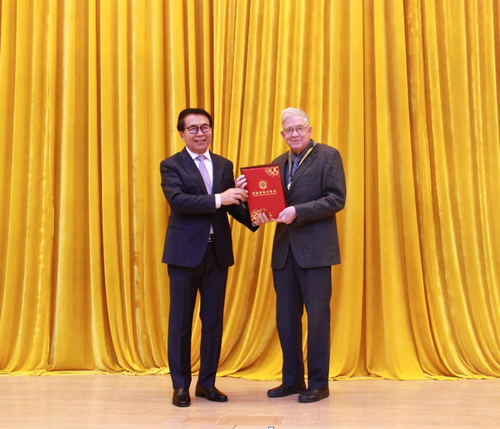Professor Richard Strom Received the 2019 Award for International Scientific Cooperation of the Chinese Academy of Sciences
At the 2020 working conference of the Chinese Academy of Sciences (CAS) on January 16, 2020, three distinguished foreign scientists were awarded the 2019 CAS Award for International Scientific Cooperation, including Professor Richard Strom from the Netherlands Institute for Radio Astronomy (ASTRON), proposed by the National Astronomical Observatories of Chinese Academy of Sciences (NAOC). The other two are Professor Sokrates Theodore Pantelides, proposed by UCAS, and Professor Ewald Schnug, proposed by Shenyang Institute of Ecology.
The Award medals and certificates to the three experts were presented by Prof. Bai Chunli, President of CAS, followed by a luncheon for the experts and their spouses. Prof. Zhang Yaping, Vice President of CAS; Prof. Li Yin, Director-General of Bureau of International Cooperation of CAS; and Prof. Zhao Gang, Legal Representative and Deputy Director-General of NAOC, were present at the ceremony.
The CAS Award for International Scientific Cooperation is designed to reward long-term cooperation with CAS scientists, for achieving breakthroughs in key technologies and producing major results, as well as building large scientific installations, and educating young scientific research talent for the CAS. The qualified excellent foreign talents include those who have made outstanding contributions in promoting the development of international scientific and technological cooperation with CAS, strengthening the scientific and technological innovation work and pushed the "four first-class" construction of CAS, expanding the influence of CAS in the international science and technology community. Since its establishment in 2007, 2-3 awardees have been selected every year.
The award for Prof.Richard Gordon Strom marks the first time that an expert recommended by the NAOC receives such an honor. Prof. Strom has been engaged in scientific and technological cooperation with CAS for about 30 years, and is the only foreign expert to be involved in the Five-hundred-meter Aperture Spherical radio telescope ( FAST) project in China over such a long period. In May of 1993, during a visit to the then Beijng Astronomical Observatory (BAO), he participated in discussing the future development of the Miyun Synthesis Radio Telescope ( MSRT ), and introduced a large radio telescope (LT) plan for consideration, which was renamed as the Square Kilometer Array (SKA) in 1999, and inspired NAOC to propose the LT of China concept,which gradually developed into a FAST proposal. In 1994, Professor Richard brought a receiver from the Netherlands to participate in site selection for a large telescope in China, participated in FAST electromagnetic environment monitoring for 12 years, prepared jointly the site technical report, and co-published the first article on the FAST scientific objectives. He also participated in FAST feed support experiments and R & D of key technologies for telescope receivers, as well as astronomical observations with the overall model MyFAST (Miyun FAST demonstrator).
Prof. Strom has worked closely with the FAST team for more than 20 years, while he has provided tremendous support and assistance for FAST initiatives, pre-research, project establishment and construction, and played an important role in the leapfrog development of China's radio astronomy. Moreover, he is actively involved in the study of ancient Chinese astronomy and has unique insights in the study of ancient supernovae and solar grazing comets.
As a link between CAS and the Royal Netherlands Academy of Sciences and the global radio astronomy community,he played a role in China's joining the European VLBI network and participating in SKA. In his visits to China, he has traveled to almost all astronomical observatories and astronomy departments in China, carried out a series of academic lectures and popular science seminars, and actively recommended Chinese young scholars to study in the Netherlands, and made outstanding contributions to the cultivation of young astronomy talent in China.

Prof. Bai Chunli presented the certificate to Prof.Richard Strom.